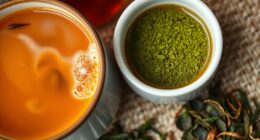Imagine enjoying a cozy cup of tea on a crisp morning, watching the steam gently waft towards your face as you take in the delightful aroma. But what if this tea could offer more than just warmth? What if it could also enhance your immune system, decrease inflammation, and promote better health overall?
Enter turmeric tea. Turmeric tea has been gaining popularity in recent years, thanks to its potential health benefits. Made from turmeric, a bright yellow spice commonly used in Indian and Middle Eastern cuisine, turmeric tea has been used for centuries in traditional medicine to treat a variety of ailments.
But is it really as beneficial as people claim? Let’s take a closer look at the science behind turmeric tea.
Key Takeaways
- Turmeric tea contains curcumin, which has anti-inflammatory and antioxidant properties that can benefit overall health.
- Clinical studies suggest that turmeric tea may have anti-inflammatory, antioxidant, and potentially antidepressant effects, as well as benefits for skin health.
- Turmeric tea should be consumed in moderation, as excessive consumption may lead to adverse effects, and it may interact with certain medications.
- Incorporating a variety of teas into a diet can help obtain a healthy balance of nutrients and antioxidants, and the optimal dosage and timing of turmeric tea may vary based on individual factors.
What is Turmeric Tea?
You might already know about turmeric, but have you tried making a warm and cozy cup of turmeric tea? It’s a simple and delicious way to enjoy the health benefits of this golden spice.
Turmeric tea is made by simmering turmeric powder or fresh turmeric root in water or milk. It has a distinct earthy flavor with a hint of bitterness that can be balanced with honey or lemon. The health benefits of turmeric tea are numerous.
Turmeric contains a compound called curcumin, which has anti-inflammatory and antioxidant properties. Drinking turmeric tea regularly may help reduce inflammation, boost immunity, improve digestion, and even promote brain health.
Additionally, turmeric tea can be enjoyed in various flavor variations by adding spices like ginger, cinnamon, or cardamom. With all these benefits, it’s no wonder that turmeric tea has become a popular beverage choice.
Moving on to the next section, let’s take a closer look at the nutritional profile of turmeric tea.
Nutritional Profile of Turmeric Tea
With its rich blend of antioxidants and anti-inflammatory properties, sipping on a warm cup of turmeric-infused brew is like taking a soothing hug for your insides.
Turmeric tea is a popular herbal beverage that has been enjoyed for centuries due to its unique taste and potential health benefits. You may be surprised to know that turmeric tea is a low-calorie drink that contains essential nutrients such as vitamins C and E, potassium, iron, and magnesium.
Not only is turmeric tea a healthy beverage option, but it also has culinary uses. Turmeric is a spice commonly used in Indian and Middle Eastern cuisine to add flavor and color to dishes such as curries, soups, and rice. However, consuming turmeric in tea form allows for a more concentrated dose of the beneficial compounds found in this spice.
In the next section, we will explore the potential health benefits of turmeric tea and how it can positively impact your well-being.
Potential Health Benefits of Turmeric Tea
By incorporating turmeric-infused brew into your daily routine, you may experience potential health benefits that can positively impact your overall well-being. Here are three potential health benefits of turmeric tea:
-
Reducing inflammation: Turmeric contains a compound called curcumin, which has been shown to have anti-inflammatory effects in the body. Inflammation is a common factor in many chronic diseases, including heart disease, cancer, and Alzheimer’s. Drinking turmeric tea regularly may help reduce inflammation in the body.
-
Boosting antioxidant levels: Antioxidants are important for protecting the body from damage caused by free radicals. Turmeric contains antioxidants that can help boost your body’s antioxidant levels. Drinking turmeric tea may help reduce oxidative stress in the body and lower the risk of chronic diseases.
-
Supporting digestive health: Turmeric has been traditionally used to support digestive health. It may help reduce symptoms of indigestion, bloating, and gas. Turmeric supplements are available in capsule form, but drinking turmeric tea may be a more enjoyable way to incorporate this spice into your diet.
Scientific evidence supporting the use of turmeric tea is still being studied, but there’s promising research on the potential health benefits of this spice.
Scientific Evidence Supporting the Use of Turmeric Tea
When it comes to the scientific evidence supporting the use of turmeric tea, there are a number of clinical studies and research that have been conducted. These studies have suggested that turmeric tea may have a range of health benefits, including anti-inflammatory and antioxidant properties.
However, it’s important to note that there are also limitations and inconsistencies in the research, which means that more studies are needed to fully understand the potential benefits of turmeric tea.
Clinical Studies and Research
You may be wondering, "What do clinical studies and research say about the potential benefits of turmeric tea?"Here are some findings from studies on turmeric supplements and turmeric for skin health:
-
A study published in the Journal of Clinical Psychopharmacology found that turmeric supplements may have antidepressant effects in people with major depressive disorder.
-
Another study published in the journal Phytotherapy Research found that curcumin, the active ingredient in turmeric, can improve skin elasticity and hydration, which may help with anti-aging.
-
A review of clinical studies on turmeric for skin health published in the journal Biomedicine & Pharmacotherapy found that it may have anti-inflammatory and antioxidant effects, which can benefit skin health.
-
However, more research is needed to confirm these findings and to determine the optimal dosage and duration of turmeric supplementation for specific health benefits.
As promising as these findings may be, there are also limitations and inconsistencies of research that should be considered.
Limitations and Inconsistencies of Research
Although research has shown some potential benefits of consuming turmeric, there are still limitations and inconsistencies in the studies conducted. One major limitation is that many of the studies have been conducted on animals, and the results may not necessarily translate to humans. Additionally, there have been potential biases in some of the studies, such as not controlling for other factors that could influence the results.
Another inconsistency in the research is the dosage and form of turmeric used in the studies. Some studies have used supplements containing high doses of curcumin, while others have used much lower doses or only included turmeric as part of a diet. This variability makes it difficult to draw conclusions about the effectiveness of turmeric tea specifically.
Despite these limitations and inconsistencies, many people still choose to consume turmeric tea for its potential health benefits.
Possible side effects of turmeric tea include gastrointestinal issues and interactions with certain medications, which will be discussed in the subsequent section.
Possible Side Effects of Turmeric Tea
Possible side effects of turmeric tea include stomach upset, nausea, or diarrhea in some people. While turmeric is generally considered safe, it is important to be aware of potential adverse reactions, especially if you are consuming large amounts of the spice. In some cases, turmeric may also interact with certain medications, such as blood thinners or diabetes drugs, so it is important to talk to your healthcare provider before adding turmeric tea to your diet.
To help you make an informed decision about whether turmeric tea is right for you, here is a table outlining the possible side effects and precautions to take:
| Possible Side Effects | Precautions to Take |
|---|---|
| Stomach upset | Start with small amounts and gradually increase |
| Nausea | Avoid consuming on an empty stomach |
| Diarrhea | Drink plenty of water and avoid consuming too much turmeric |
Remember, while turmeric tea has many potential health benefits, it is important to consume it in moderation and be aware of any possible side effects. In the next section, we will discuss the proper dosage and preparation of turmeric tea to help you get the most out of this powerful spice.
Dosage and Preparation of Turmeric Tea
If you’re wondering how much turmeric tea you should drink, the general recommendation is around 1-2 cups per day.
The best time to drink turmeric tea is in the morning or before bed, as it can help with digestion and promote relaxation.
To prepare turmeric tea, simply boil water and add a teaspoon of turmeric powder or grated fresh turmeric root, along with any other desired ingredients such as honey or ginger.
How Much Turmeric Tea Should You Drink?
To maximize the benefits of turmeric tea, it’s recommended to consume at least one cup per day. However, the dosage may vary depending on your health condition and tolerance. It’s important to note that excessive consumption of turmeric tea may also lead to adverse effects such as stomach upset, nausea, and diarrhea. Hence, it’s crucial to consult with your healthcare provider before incorporating turmeric tea into your daily routine.
To help you determine the appropriate amount of turmeric tea to drink each day, here’s a simple table that shows the recommended dosage based on your body weight:
| Body Weight | Turmeric Tea Dosage |
|---|---|
| Less than 150 lbs | 1 teaspoon turmeric powder |
| 150 – 200 lbs | 1.5 teaspoons turmeric powder |
| More than 200 lbs | 2 teaspoons turmeric powder |
Keep in mind that this dosage is just a general guideline and may still vary depending on individual factors such as age, health status, and medications taken. In the next section, we’ll discuss the best time to drink turmeric tea to further optimize its benefits.
Best Time to Drink Turmeric Tea
Now that you know how much turmeric tea you should drink, let’s talk about the best time to drink it. The timing of when you consume turmeric tea can potentially impact its effectiveness, so it’s important to know the optimal time.
The benefits and drawbacks of drinking turmeric tea at different times of the day are still being researched, but many experts suggest consuming it in the morning or before bed. This is because turmeric contains curcumin, which has anti-inflammatory and antioxidant properties that can help boost your immune system and reduce inflammation in your body. However, consuming turmeric tea too close to bedtime may also interfere with your sleep, as it can increase your metabolism and energy levels.
Ultimately, the optimal frequency and timing for drinking turmeric tea will depend on your individual needs and preferences.
Moving on to the next section, let’s explore how to prepare turmeric tea.
How to Prepare Turmeric Tea
Get ready to brew a delicious cup of golden goodness with these simple steps for preparing your very own turmeric-infused drink. Turmeric tea is packed with health benefits, making it a great addition to your daily routine. From reducing inflammation to boosting immunity, this ancient spice has been used for centuries in traditional medicine.
To make turmeric tea, start by boiling water and adding turmeric powder. You can also add other ingredients like ginger, honey, or lemon to enhance the flavor and add even more health benefits. After steeping for a few minutes, strain the tea and enjoy hot or cold. There are also many variations of turmeric tea, including golden milk and turmeric latte, which incorporate different ingredients and preparation methods. Experiment with different recipes to find the one that works best for you and your taste buds.
Now that you know how to prepare turmeric tea and the benefits it offers, you may be wondering about other options for incorporating healthy drinks into your routine.
Alternatives to Turmeric Tea
You might want to consider spicing things up and trying out other teas instead of just relying on turmeric tea.
There are plenty of turmeric tea substitutes that can offer similar health benefits. For example, ginger tea and green tea both contain antioxidants and anti-inflammatory properties that can help improve digestion and promote overall well-being. Additionally, other herbal teas such as chamomile and peppermint can help soothe and relax the body.
While turmeric tea has its own unique benefits, exploring other tea options can provide a wider range of health benefits. It’s important to remember that incorporating a variety of teas into your diet can help you obtain a healthy balance of nutrients and antioxidants.
With that being said, let’s explore some tips for incorporating turmeric tea into your diet.
Tips for Incorporating Turmeric Tea into Your Diet
If you’re looking to incorporate this flavorful and healthy beverage into your daily routine, there are a few simple tips to keep in mind. First, start with a high-quality turmeric powder or fresh turmeric root. This will ensure that you’re getting the maximum benefits from the tea. You can also experiment with different turmeric tea recipes to find one that suits your taste preferences. Some popular variations include adding ginger, honey, or lemon juice.
Aside from its delicious taste, turmeric tea is known for its numerous health benefits, including aiding in weight loss. To maximize these benefits, try drinking turmeric tea before or after meals. This can help boost your metabolism and aid in digestion. Additionally, incorporating turmeric tea into your daily routine can help you stay hydrated and avoid sugary drinks that can contribute to weight gain. With these simple tips, you can easily incorporate turmeric tea into your diet and reap the many benefits it has to offer.
Frequently Asked Questions
Can turmeric tea help with weight loss?
Turmeric tea may aid weight loss through its impact on metabolism and appetite suppression. One anecdote compares it to a turbocharger, enhancing the body’s natural processes. Evidence suggests it may be a helpful addition to a healthy lifestyle.
Is it safe to consume turmeric tea while pregnant or breastfeeding?
It is generally safe to consume turmeric tea during pregnancy or breastfeeding, but excessive amounts may pose a risk. Turmeric has nutritional properties and potential benefits, but always consult with a healthcare provider before adding it to your diet.
Can turmeric tea interact with any medications?
While turmeric tea is generally safe, it can interact with certain medications. It may increase the risk of bleeding when combined with blood thinners, and may also interact with diabetes and stomach acid medications. It’s important to talk to your doctor about any potential risks before consuming turmeric tea.
How long does it take to see the potential health benefits of turmeric tea?
It may take several weeks of consistent turmeric tea consumption to potentially see health benefits. Dosage recommendations vary, but experts suggest 400-600 mg of curcumin per day. Keep in mind individual results may vary.
Can turmeric tea help with skin conditions such as acne or eczema?
Turmeric tea may help with skin conditions such as acne and eczema due to its anti-inflammatory and antioxidant properties. The benefits of turmeric tea for skin rejuvenation include reducing redness, inflammation, and promoting overall skin health.
Conclusion
So, is turmeric tea beneficial? Based on the research and anecdotal evidence, it definitely has the potential to be.
Turmeric tea contains a variety of nutrients and compounds that may offer health benefits such as reducing inflammation, improving brain function, and lowering the risk of chronic diseases.
However, it’s important to keep in mind that turmeric tea is not a cure-all and should not be relied on as the sole solution to any health issues. As with any supplement or dietary change, it’s important to consult with a healthcare professional before incorporating turmeric tea into your routine. Additionally, while turmeric tea is generally safe for most people, it may cause side effects in some individuals.
In conclusion, if you’re looking to add a flavorful and potentially beneficial beverage to your diet, turmeric tea may be worth a try. Just be sure to do your research, check with your healthcare provider, and listen to your body. As the saying goes, "everything in moderation"- including turmeric tea.










